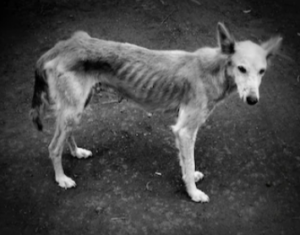
“Never feeling full” is a poor description of the hunger of Prader-Willi syndrome.
We’ve all been hungry, but not hungry enough to eat dog food or cardboard.
Those with Prader-Willi syndrome have been known to eat non-edible items as these, as well as mayonnaise and vegetable oil straight from the jar, cake mix straight from the box, spoiled food from garbage cans, etc.
What kind of hunger drives this?
I once read of a man who, after several days of being stranded in the wilderness, ate hand lotion. He had eaten insects. Stranded people like this will catch bugs and rodents for food and eat leaves and twigs.
They feel so hungry, but they also know they’ll die without eating. And that’s the key feature: They know death is knocking on their door.
But in Prader-Willi syndrome, even the most intelligent of those afflicted know that they are not dying of starvation or becoming sicker with malnourishment.
They know they are well-fed but are still inclined to seek food in ways comparable to those stranded for days in the wilderness or in famished Fourth World lands.
A person with Prader-Willi syndrome is not able to describe their hunger because they’ve never experienced satiation in their conscious memory to compare it to.
The hunger of Prader-Willi begins between the age of two and five, so it’s difficult, if not impossible, for a patient to be able to recollect what their stomach felt like before this time in their life.
How many of us recall how our bellies felt when we were only three years old?
As a writer, I’ve sought out patients with Prader-Willi in an attempt to get a description of what the hunger feels like. I have come up empty-handed with willing participants.
But again, they wouldn’t have a reference point of satiation to describe it.
Other writers will describe the feeling of Prader-Willi hunger as “never feeling full.” I hate this description. It does no justice.
Right now as I compose this article, I am not full. Chances are, you yourself as you read this do not feel “full” either.
Yet do you feel like eating out your entire cupboards and refrigerator?
Most healthy people, at any given random time, do not feel full. This is because most people don’t eat past the point of “I’ve had enough.”
They are not full, yet are not interested in eating the quantities of food that those with PWS will eat if left unsupervised to food availability.
Exceptions are those with compulsive overeating disorder (e.g., “My 600 Pound Life,” the TLC reality TV show).
But typical people have no interest in eating nonstop just because they don’t “feel full.”
So when someone writes that “never feeling full” is what drives a person with Prader-Willi syndrome to eat, this is very irresponsible journalism.
Many healthy people rarely feel full because they stop eating at the point of satiation or that feeling of “I’ve had enough.”
Therefore, one can conclude that merely not feeling full is not sufficient enough to drive someone to dig into dumpsters for food scraps, break into cars to gain access to visible food, or eat dog food or vegetable oil.
Why don’t journalists and bloggers simply tell it like it is: Patients with Prader-Willi syndrome have a never-ending feeling of starvation—akin to what healthy people would feel if being stranded in the wilderness for several days without a single morsel of food.
It’s not about “never feeling full.” It’s about ALWAYS FEELING STARVED. Imagine what an emaciated child of a Fourth World nation feels on a minute-by-minute basis.
That’s got to be Prader-Willi syndrome.
The difference is that the starving child (or adult) intuitively knows that lack of food is slowly killing them.
One of the features of most people with PWS is intellectual disability. But many patients have solid insight into their condition and are even quite articulate, and thus, know that they are not dying from lack of food.
Yet when the opportunity arises, they will forage and seek food as though one more hour without will kill them. There are cases in which patients have eaten themselves to a fatal stomach rupture. That’s how brutal their hunger must be.
Acquired Prader-Willi Syndrome
Traumatic or acquired PWS also goes by the name hypothalamic obesity. This is caused by a brain tumor.
People with this condition know what satiation feels like. In my quest to find out what the hunger of Prader-Willi syndrome feels like, I once sought out those with the acquired form.
I found one person, a young man. He had been perfectly normal until the brain tumor began growing. His hypothalamus was damaged and from that point, he suffered from the “insatiable hunger” that afflicts those with genetic PWS.
He became morbidly obese and had to live in a home for those with PWS: Food was locked up; 24-hour supervision to make sure residents didn’t sneak out to seek food.
This young man, when asked to give a description comparing his post-tumor hunger to his pre-tumor hunger, was unable to do so.
I didn’t push it; the poor man’s world had been turned inside out.
If a drug is ever developed that will provide satiation to those with genetic Prader-Willi syndrome, only then will patients be able to give that comparative description of what their hunger feels like.
But one thing’s for sure: It doesn’t feel like “never being full.” Please, enough of that lame description already.
 Lorra Garrick has been covering medical, fitness and cybersecurity topics for many years, having written thousands of articles for print magazines and websites, including as a ghostwriter. She’s also a former ACE-certified personal trainer.
Lorra Garrick has been covering medical, fitness and cybersecurity topics for many years, having written thousands of articles for print magazines and websites, including as a ghostwriter. She’s also a former ACE-certified personal trainer.
.

























